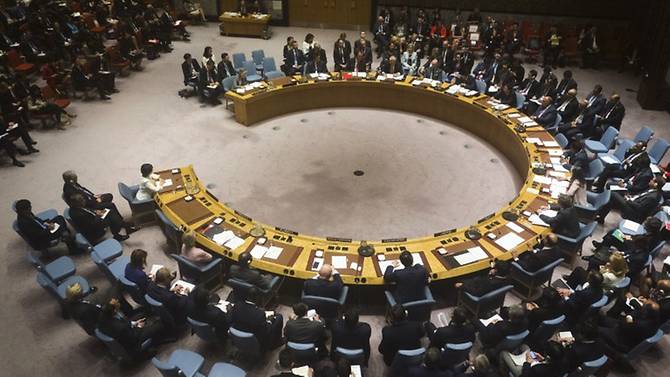UN Security Council to meet on North Korea missile launch
 |
| File photo of a UN Security Council meeting. (Photo: AFP/Don Emmert) |
The United States, Japan and South Korea moved quickly to request the meeting to address Pyongyang's launch of the ICBM which the Japanese defence ministry said probably fell within Japan's exclusive economic zone.
Council members will meet in open session from 4.30pm (5.30am Thursday Singapore time).
The council was already scheduled to discuss progress in implementing three recently-adopted rounds of sanctions aimed at choking off revenue to Pyongyang's military programmes.
Since November last year, the council has slapped export bans on coal, iron, lead, textiles and seafood, restricted joint ventures and blacklisted a number of North Korean entities in response to the country's missile and nuclear tests.
It has also banned the hiring of North Korean guest workers and capped oil exports, in particular from China, Pyongyang's main trading partner.
Under UN resolutions, North Korea is barred from developing missiles and a nuclear weapons capability but Pyongyang argues that the arsenal is needed for self-defense against the "hostile" United States.
The launch on Wednesday was the first ballistic missile test in more than two months, ending a lull that some diplomats said had opened a window of opportunity for diplomatic talks.
It was also the North's third successful test of an ICBM which has the range to reach the mainland United States, although experts caution Pyongyang may have not yet mastered the full technological capability.
The Pentagon said its initial assessment showed that the ICBM flew about 1,000 kilometres.
Speaking in Washington, US Secretary of State Rex Tillerson called for "additional measures" to toughen up sanctions, including allowing countries to intercept vessels carrying goods to and from North Korea.
What the stars mean:
★ Poor ★ ★ Promising ★★★ Good ★★★★ Very good ★★★★★ Exceptional
Latest News
More News
- Russian President congratulates Vietnamese Party leader during phone talks (January 25, 2026 | 09:58)
- Worldwide congratulations underscore confidence in Vietnam’s 14th Party Congress (January 23, 2026 | 09:02)
- Political parties, organisations, int’l friends send congratulations to 14th National Party Congress (January 22, 2026 | 09:33)
- 14th National Party Congress: Japanese media highlight Vietnam’s growth targets (January 21, 2026 | 09:46)
- 14th National Party Congress: Driving force for Vietnam to continue renewal, innovation, breakthroughs (January 21, 2026 | 09:42)
- Vietnam remains spiritual support for progressive forces: Colombian party leader (January 21, 2026 | 08:00)
- Int'l media provides large coverage of 14th National Party Congress's first working day (January 20, 2026 | 09:09)
- Vietnamese firms win top honours at ASEAN Digital Awards (January 16, 2026 | 16:45)
- ASEAN Digital Ministers' Meeting opens in Hanoi (January 15, 2026 | 15:33)
- ASEAN economies move up the global chip value chain (December 09, 2025 | 13:32)
















 Mobile Version
Mobile Version